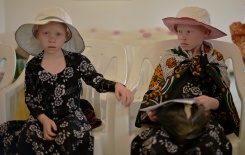DAR ES SALAAM - A "Miss and Mister Albino" contest, heavy sentences for ritual murder and concrete graves to ward off tomb raiders were all discussed at a UN summit on albinism concluding in Tanzania on Monday.

Albino girls wait at a clinic run by the Standing Voice NGO, on Ukerewe Island on Lake Victoria during International Albinism Awareness Day on June 13, 2016
During the four-day meeting people with albinism and advocates for their rights discussed ways to safeguard and improve the lives of those who suffer discrimination, health problems and even murder as a result of the condition that leaves their skin without pigment.
It is a particular problem in Africa in general and in Tanzania in particular, which is why the East African nation was chosen to host the summit.
"Of all the regions in the world, Africa is the most hostile for people with albinism," said Ikponwosa Ero, an independent expert on albinism.
Some 150 civil society and government representatives from 29 African countries, many of them albino themselves, gathered in Dar Es Salaam to swap experiences and ideas on improving security and integration.
In Africa, the scorching sun makes people with albinism particularly susceptible to skin cancer while discrimination and prejudice sees them attacked or shunned in several countries.
Albino graves have been looted and people killed to supply a grisly black market trade in albino body parts thought by some to bring good luck or wealth.
Under The Same Sun, a Canadian charity, has documented 457 attacks on albinos -- including 178 murders -- in 26 African countries mostly over the last decade, although the precise extent of the phenomenon is hard to define because of the secrecy surrounding the illegal trade in albino body parts.
- 'Unprecedented' onslaught -
"The idea is to build a roadmap of simple, effective and cheap measures", said Ero, including basic protections such as ensuring people with albinism are surrounded by trusted neighbours and have a lockable door to their homes.
It was also suggested that albino graves should be protected from body-snatchers by using cement to cover the graves so that the bodies can't be exhumed.
Alex Michila, vice president of the Albino Association of Malawi, where Amnesty International recently described an "unprecedented" wave of attacks, said it was important that albino children be encouraged to "interact with people who do not have albinism" to foster integration.
Possi Abdallah, Tanzania's deputy minister for disability and himself an albino, argued for the importance of "exemplary and dissuasive" sentences for those convicted of killing people with albinism.
- Kenya a good student -
Ero said the roadmap should be drafted by late 2017 and will then be submitted to the African Union.
"Having a pan-African voice is crucially important, because we need to put pressure on governments in Africa," said Jon Beale, director of the non-government organisation Standing Voice. "Together we have more weight."
Kenya is seen as setting a good example in the region, by providing government-funded cancer treatment, sunscreen distribution programmes and setting up an emergency hotline for reporting attacks on people with albinism.
The presence of albinos in Kenya's public sphere -- such as the MP Isaac Mwaura and high court judge Grace Ngugi -- was also hailed as a positive sign, as was the plan to hold a Miss and Mr Albino contest in Nairobi on September 9.
"When you have Miss and Mr Albinism, we redefine ourselves as beautiful and handsome people, we are not ghosts," said Mwaura.